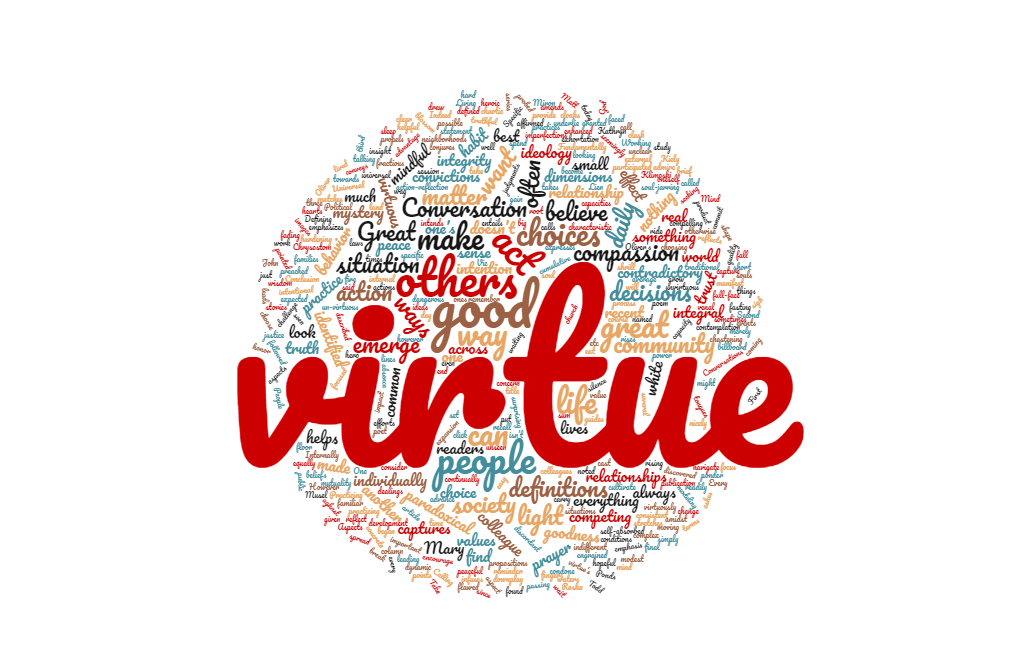Calling It To Mind
A Great Conversation On Virtue
Most of us take virtue for granted since its absence conjures images of people who are venal, self-absorbed, and indifferent to the common good. In a recent session of the Great Conversations series, we discovered that a full-face look at virtue helps us to remember the dynamic quality of virtue. Fundamentally, virtue isn’t a set of beliefs or propositions; it is a way of being in life.
In this brief article, I want to draw on the wisdom of my colleagues who participated in the Conversation to capture some ideas that might encourage readers to call to mind what is important for them about virtue.
Defining Virtue
Working definitions are always helpful guides. Take a look at what we identified individually.
Virtue is the practice of choosing the best possible good in any given situation amidst competing, paradoxical, and often contradictory values. Kiely Todd Roska
Virtue is an integral goodness affirmed by intentional decisions to act with integrity and compassion in daily relationships with others. Mary Jo Miron
Virtue cloaks a life of seeking to do good in ways surprising and expected, always moving one towards an unseen but hopeful end. Kathryn Lien
Virtue is the practice of doing good, consistent in small and big things, through prayer that intends a habit and actions seen by God and others. Matt Musel
Virtue infuses choices to act with a sense of compassion for the other, concern for the common good, and expansion of one’s capacity to effect good in the world. Vic Klimoski
Exploring Its Aspects
As we probed our definitions, we identified several aspects across the definitions that enhanced what we individually named. First of all, virtue has both internal and external dimensions. Internally, we are talking about soul development and a sense of oneself defined by virtue. However, virtue propels us to action in lives lived with others. One colleague described this in terms of virtue’s universal and specific dimensions. “Universal” captures the convictions we have about truth, goodness, community, mutuality, etc. “Specific”, however, emphasizes choices in this concrete, real situation so that our behavior matches our intention.
Second, while virtue sometimes calls for heroic action, it is equally manifest in the small, seemingly modest choices made in the course of an average day. This reflects the traditional emphasis on virtue as habit – something so engrained in one’s way of being that to act otherwise would be discordant and soul-jarring. A third aspect focused on mystery. Being virtuous entails a trust even when the way is unclear or, as another colleague noted, we are faced with “competing, paradoxical, and often contradictory values.” Mary Oliver captures this nicely in her poem, “The Ponds”:
I want to believe I am looking
into the white fire of a great mystery.
I want to believe that the imperfections are nothing –
that the light is everything — that it is more than the sum
of each flawed blossom rising and fading. And I do.
Practicing Virtue
It is easy to be virtuous when the conditions are clear. But the real challenge rises when we find ourselves, well, as we do today in a complex, fractious, chaotic, and often shrill society. Being mindful of virtue and its work in us helps provide a way to navigate these dangerous white waters. We focus on the light cast by virtue and trust in its leading power.
Oliver’s compelling exhortation leads to a final characteristic readily familiar to readers of this publication if we are to “believe the light is everything.” We cultivate virtue by prayer, study, and contemplation – these practices underlie the title of this column. Indeed, virtue takes root in our souls, but it can become something we merely admire if we do not recall again and again what it expresses about who we are, how we are in relationship with others and the world, and the ways in which it stretches us.
Conclusion
Here are three points to consider as you ponder virtue in your life and in the life of our church and society:
- Virtue is a process, not a product. Living virtuously is a matter of action-reflection. We make a choice to act and then reflect on its impact. We grow and change and gain insight into our capacities to choose with “integrity and compassion” AND how to make amends and began again when we fall short.
- Virtue is preached best by modeling. We have stories of the un-virtuous coming at us all the times. We can click our tongues and wag our fingers. We can wait for a hero to ride in and spread virtue across the land. But as another poet once said, “We are the ones we have been waiting for.” Every choice made in every situation conveys the convictions we carry in our hearts. We should not downplay the cumulative effect of our efforts.
- Virtue, not ideology, should shape our judgments of people, events, and decisions. Political lines are hardening. People who, in other situations, would be aghast at unvirtuous behavior, find ways to condone it because to break silence would clash with their ideology. A truthful community doesn’t emerge because we put up a billboard but because people honor truth in their daily lives; a just society doesn’t emerge by simply passing laws but by people practicing justice in their daily dealings; a peaceful community will not emerge because people value peace but because they make choices that advance peace – in their relationships, their families, their neighborhoods, and the public decisions they make.
Over and over in the recent Great Conversation, we pointed to the integral relationship between intention and action. I found this statement from St. John Chrysostom a chastening reminder as I commit to be being more mindful about virtue:
No one act of virtue can be great if it is not followed by advantage for others. So no matter how much time you spend fasting, no matter how much you sleep on a hard floor and eat ashes and continually sigh, if you do no good to others, you do nothing great.
We are all called to “do great.”

Read more about the Benedictine commitment to learning.
Explore upcoming events with Victor Klimoski.







1 Response